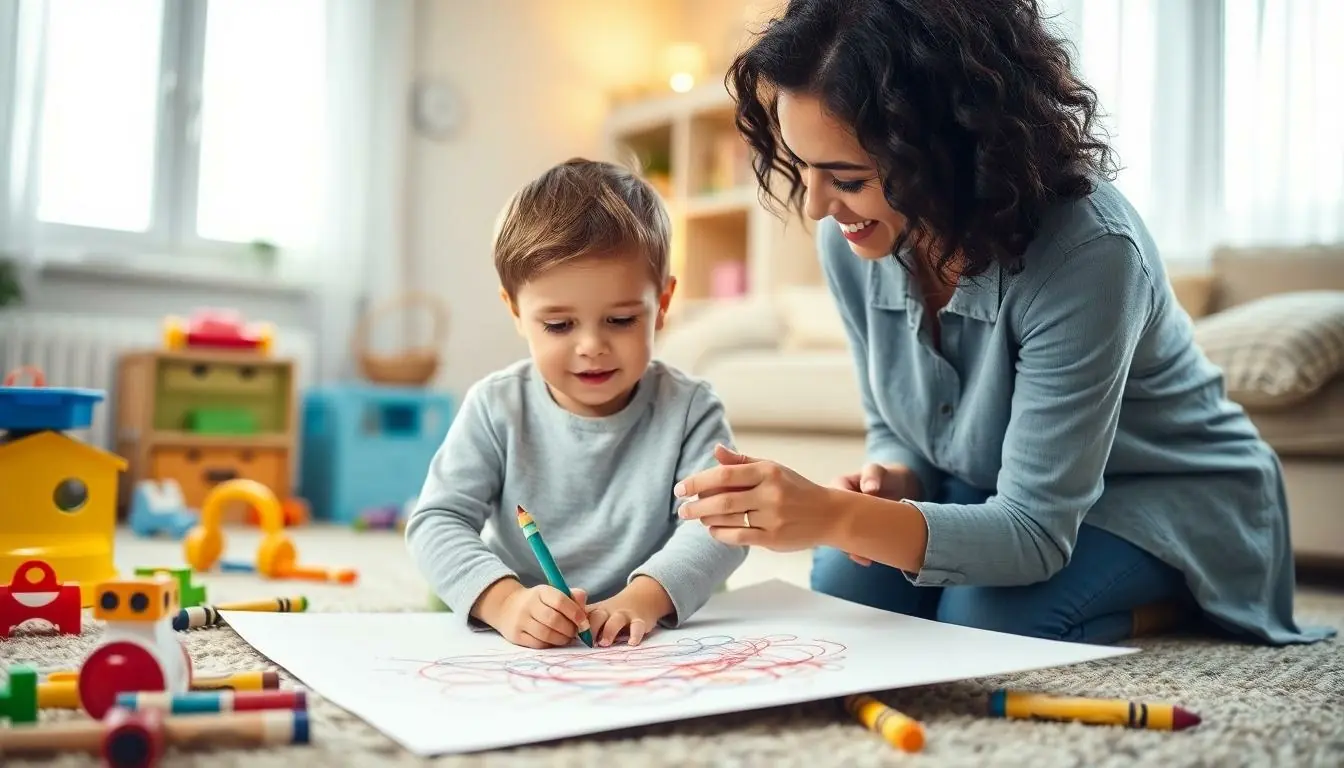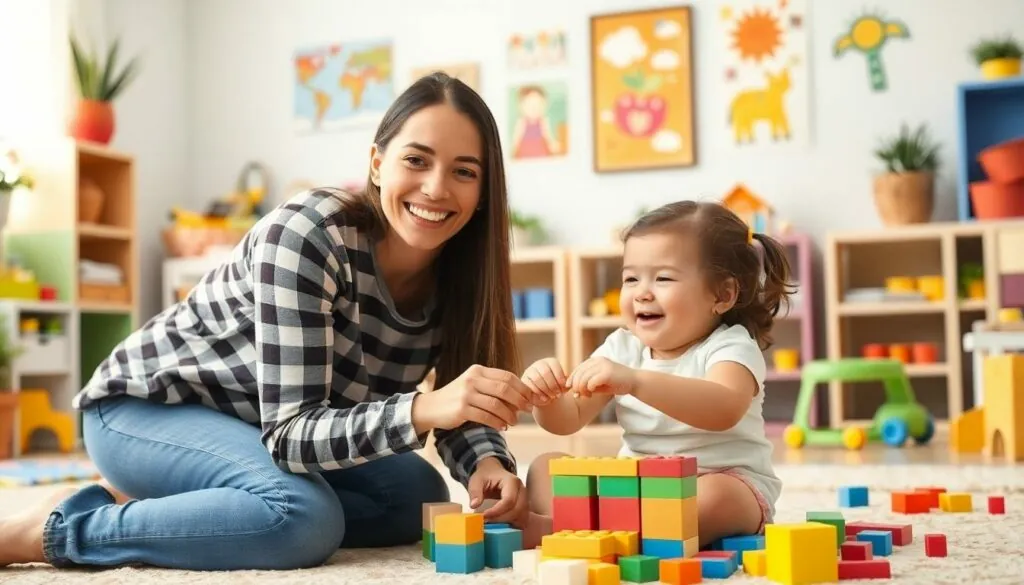Navigating the toddler years can feel like trying to tame a wild animal with a crayon in one hand and a snack in the other. These tiny humans are full of energy, curiosity, and the occasional tantrum that could rival a Broadway show. But fear not—parenting doesn’t have to be a circus act. With the right tips in your toolkit, you can turn chaos into a delightful adventure.
Table of Contents
ToggleUnderstanding Toddler Development
Understanding toddler development is crucial for effective parenting. This stage features numerous changes that shape children’s behavior and skills.
Key Milestones
Children typically reach specific milestones between ages one and three. Physical skills often include walking, running, and climbing. Cognitive development includes problem-solving and imaginative play, while language skills advance significantly. By age two, many children can form simple sentences. Social milestones encompass sharing and taking turns, fostering early friendships and cooperation.
Emotional and Social Growth
Emotional development in toddlers involves forming attachments and expressing feelings. They begin to recognize emotions in others, enhancing empathy. Socially, play becomes interactive and collaborative, allowing children to develop social skills. At this stage, tantrums frequently emerge as toddlers struggle with frustration. Building emotional regulation often occurs through guidance and reassurance from parents, promoting healthier interactions.
Effective Communication Strategies

Effective communication enhances a toddler’s language skills and emotional development. Utilizing specific techniques promotes a connection between parent and child.
Active Listening Techniques
Active listening fosters understanding. Parents should maintain eye contact while observing their child’s body language. Nodding along shows engagement, confirming that the child is being heard. Repeating or paraphrasing what the toddler expresses validates their feelings and thoughts. Encouraging pauses allows toddlers to gather their thoughts, leading to clearer communication. Choosing a quiet space minimizes distractions, ensuring that conversations remain focused. Implementing these techniques enhances the child’s confidence in expressing themselves.
Encouraging Expression
Encouraging expression nurtures a child’s emotional growth. Parents can set aside time for storytelling or reading together, stimulating imagination and vocabulary. Asking open-ended questions invites toddlers to share feelings and thoughts, promoting deeper conversations. Providing various art supplies like crayons and paper offers alternative means to express emotions visually. Celebrating their attempts at communication reinforces efforts and boosts self-esteem. Incorporating playful activities like role-playing scenarios allows toddlers to explore different perspectives. These methods create a more nurturing environment that inspires self-expression.
Positive Discipline Approaches
Positive discipline fosters a healthy parent-child relationship, encouraging toddlers to understand acceptable behavior within a nurturing environment.
Setting Boundaries
Establishing clear boundaries helps toddlers comprehend limits. Parents should communicate expectations using simple language. Be consistent in enforcing rules to build a sense of security. For instance, designate specific areas for play, ensuring they understand where they can explore freely. Setting time limits for activities also aids in creating routines. When boundaries are crossed, calmly remind them of the rules instead of reacting harshly. Such approaches empower toddlers to make informed choices, fostering responsibility and self-control.
Rewarding Good Behavior
Recognizing positive actions reinforces desirable behaviors in toddlers. Utilize praise to celebrate achievements, no matter how small. Simple statements like “Great job sharing your toys!” encourage repetition of good actions. Consider using reward systems, such as sticker charts, to visualize progress. This tangible feedback motivates toddlers to strive for positive reinforcement. Additionally, connecting rewards to their interests enhances engagement. Celebrating good behavior builds confidence, helping children internalize that their efforts have value.
Encouraging Healthy Habits
Encouraging healthy habits during toddler years sets a foundation for lifelong wellness. Parents play a crucial role in guiding nutrition and physical activity.
Nutrition Tips
Incorporating a variety of fruits and vegetables into daily meals benefits a toddler’s health. Serve colorful options, like berries, carrots, and broccoli, to spark interest. Opt for whole grains such as brown rice and whole-wheat bread instead of refined grains. Limit sugary snacks and drinks, replacing them with water and nutritious snacks like yogurt or nuts. Offering meals at regular times helps establish a routine, promoting better eating habits. Involve toddlers in meal preparation to ignite curiosity about healthy food choices.
Physical Activity Ideas
Encouraging active play contributes to a toddler’s physical development. Create a structured routine that includes outdoor time, such as playing at parks or engaging in simple sports. Use dance sessions at home to combine fun with exercise, allowing for creativity and movement. Play games like Simon Says or follow-the-leader that involve running and jumping to enhance coordination. Establish a playdate with peers to foster social connections while staying active. Ensure safety by choosing age-appropriate toys, such as tricycles or balls, that promote movement and exploration.
Nurturing Cognitive Skills
Nurturing cognitive skills in toddlers supports their overall development. Engaging in educational activities promotes curiosity and problem-solving abilities.
Educational Play Ideas
Creative play encourages learning through exploration. Parents can provide building blocks, puzzles, and age-appropriate games to stimulate thinking. Outdoor scavenger hunts enhance observation skills and connect toddlers with nature. Playing with shapes and colors fosters spatial awareness and encourages imagination. Interactive toys that require manipulation develop fine motor skills and cognitive processing. Furthermore, balance between structured and free play allows toddlers to learn at their own pace.
Reading Together
Reading together fosters cognitive development and language skills. Parents should choose interactive books that encourage participation. Reciting rhymes and engaging in dialogue based on illustrations enhances comprehension. Storytime can incorporate questions about the narrative, promoting critical thinking. Adding variety with different genres enriches vocabulary and understanding of diverse concepts. Regular reading habits create an enjoyable routine that supports language acquisition and emotional connection.
Navigating the toddler years can be both challenging and rewarding. By employing effective strategies and fostering a nurturing environment, parents can create a positive atmosphere that supports their child’s development. Understanding the nuances of toddler behavior and communication helps build stronger connections.
Encouraging healthy habits and engaging in creative play not only enhances cognitive and emotional growth but also lays the groundwork for lifelong wellness. With patience and consistent guidance, parents can transform the chaos of this stage into memorable moments that enrich their relationship with their child. Embracing this journey with confidence will lead to a fulfilling parenting experience.




